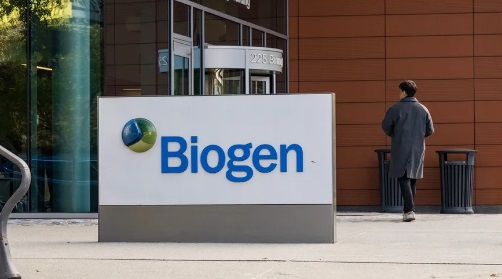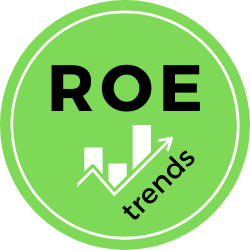Biogen stock analysis

Biogen Inc. (BIIB) is a pioneer in neuroscience, renowned for developing innovative therapies for neurological diseases such as multiple sclerosis (MS), spinal muscular atrophy (SMA), and Alzheimer’s disease. Through groundbreaking research and development, Biogen has made significant strides in treating these complex conditions. However, the company faces challenges, including increasing competition, patent expirations, and setbacks in its Alzheimer’s drug development program. This article offers a comprehensive Biogen stock analysis, examining the company’s Return on Equity (ROE), growth strategy, strengths, weaknesses, and the competitive landscape in the dynamic biopharmaceutical industry.
What is ROE, and Why Does it Matter for BIIB Investors?
Return on Equity (ROE) is a critical financial metric that measures a company’s profitability relative to shareholders’ equity. A higher ROE typically signifies better financial performance and stronger returns for investors holding BIIB stock.
Biogen’s ROE: A History of Strong Performance and Volatility
| Year | ROE (%) |
|---|---|
| 2013 | 32.5 |
| 2014 | 35.8 |
| 2015 | 39.1 |
| 2016 | 34.6 |
| 2017 | 31.2 |
| 2018 | 28.7 |
| 2019 | 26.5 |
| 2020 | 23.8 |
| 2021 | 18.5 |
| 2022 | 15.2 |
| 2023 | 17.0 |
| 2024 | 19.5* |
*Projected
Biogen has historically demonstrated strong financial performance, although its ROE has exhibited volatility in recent years, as indicated in the table above. The company has delivered significant returns for investors, especially during periods of robust growth driven by its innovative therapies for multiple sclerosis.
Key Trends in Biogen’s ROE Analysis:
- High Profitability: Biogen has consistently maintained a high ROE, generally above 25%, signifying strong profitability and efficient use of shareholder investment.
- Peak Performance: The ROE peaked at 39.1% in 2015, fueled by strong sales of its multiple sclerosis drugs, including Tecfidera and Tysabri.
- Decline in Recent Years: The ROE has declined recently, falling below 20% in 2021 and 2022 due to increased competition from generics and biosimilars, patent expirations, and challenges in its Alzheimer’s drug development program.
- Projected Recovery: The projected ROE for 2024 suggests a potential recovery, indicating that Biogen’s strategic initiatives and new product launches may lead to improved profitability in the coming years.
Investors should consider this ROE data alongside other financial metrics and qualitative factors, such as growth prospects, the pipeline of new drugs, and competitive positioning, to make informed investment decisions.
Understanding Biogen: A Focus on Neuroscience
To fully assess Biogen’s investment potential, it’s essential to evaluate its strategic direction, strengths, weaknesses, and competitive landscape.
Biogen’s Mission: “To be a pioneer in neuroscience.”
Biogen is committed to applying cutting-edge science to discover and develop innovative therapies for neurological diseases. This includes a strong focus on:
- Multiple Sclerosis: Maintaining its leadership in MS treatment with a diverse portfolio of therapies, including leading drugs like Tecfidera, Tysabri, and Vumerity.
- Spinal Muscular Atrophy: Providing groundbreaking treatments for SMA, a rare genetic disease affecting muscle strength and movement, with Spinraza as a key drug in this area.
- Alzheimer’s Disease: Continuing research and development efforts to find effective treatments for Alzheimer’s disease, a devastating neurodegenerative condition, including its controversial drug, Aduhelm.
- Neuromuscular Disorders: Expanding its portfolio of treatments for neuromuscular disorders, such as ALS (amyotrophic lateral sclerosis).
Strengths
- Strong MS Franchise: Biogen holds a leading position in the multiple sclerosis market with established drugs like Tecfidera, Tysabri, and Vumerity.
- Spinraza for SMA: Spinraza serves as a breakthrough treatment for spinal muscular atrophy, contributing significantly to Biogen’s revenue.
- R&D Expertise: The company has a robust track record of innovation and expertise in neuroscience research and development.
- Global Presence: Biogen’s significant global operations enable it to serve patients worldwide effectively.
Weaknesses
- Generic and Biosimilar Competition: Biogen faces increasing competition from generics and biosimilars for some of its key MS drugs, impacting revenue and profitability.
- Alzheimer’s Setbacks: The company has encountered setbacks in its Alzheimer’s disease program, including the controversial approval and limited uptake of Aduhelm.
- Dependence on Key Products: While Biogen has a diversified portfolio, its performance can be significantly impacted by the success of its key blockbuster drugs.
- Pricing Pressures: Biogen faces pressure to control drug prices, which can affect profitability.
Biogen’s Competitors: The Biopharmaceutical Landscape
Biogen operates in a competitive global biopharmaceutical market, contending with several major players, including:
- Johnson & Johnson: A diversified healthcare giant with a broad portfolio of pharmaceuticals and medical devices.
- Pfizer: Renowned for its innovative medicines and vaccines.
- Novartis: A global healthcare company focusing on pharmaceuticals and eye care.
- Roche: A leading biotechnology company specializing in oncology, immunology, and diagnostics.
- Eli Lilly and Company: A major player in diabetes, oncology, and immunology.
Biogen’s Key Projects
- Multiple Sclerosis Pipeline: Developing new treatments for multiple sclerosis, including oral therapies and therapies targeting progressive forms of the disease.
- Alzheimer’s Disease Research: Continuing research and development to discover effective treatments for Alzheimer’s disease.
- Neuromuscular Disorders: Expanding its treatment portfolio for neuromuscular disorders, such as ALS.
- Biosimilars: Developing and commercializing biosimilars of existing biologic drugs.
Biogen’s Future: Overcoming Challenges and Pursuing New Opportunities
Biogen’s future will depend on its ability to navigate challenges such as patent expirations and competition while continuing to innovate and bring new therapies to market. Key factors influencing its success include:
- R&D Productivity: The company’s capability to discover and develop new, effective treatments, particularly for Alzheimer’s disease, will be crucial for long-term growth.
- Commercial Success: Successfully launching and marketing new drugs and biosimilars is essential for generating revenue and maintaining profitability.
- Competitive Landscape: Biogen must effectively compete with other biopharmaceutical companies in a dynamic market.
Is Biogen (BIIB) Stock a Good Investment?
Biogen is a leading biopharmaceutical company with a solid track record of innovation and a focus on neuroscience. The company boasts a successful portfolio of drugs for multiple sclerosis and spinal muscular atrophy. However, investors should carefully weigh the risks and opportunities associated with investing in the biopharmaceutical industry, including competition, patent expirations, and the challenges of developing new treatments for complex neurological diseases.
Conclusion
This Biogen stock analysis highlights the company’s strengths and challenges in a competitive landscape. With its commitment to innovation and addressing critical health issues, Biogen remains a key player in the biopharmaceutical sector, poised to navigate challenges while pursuing sustainable growth.





